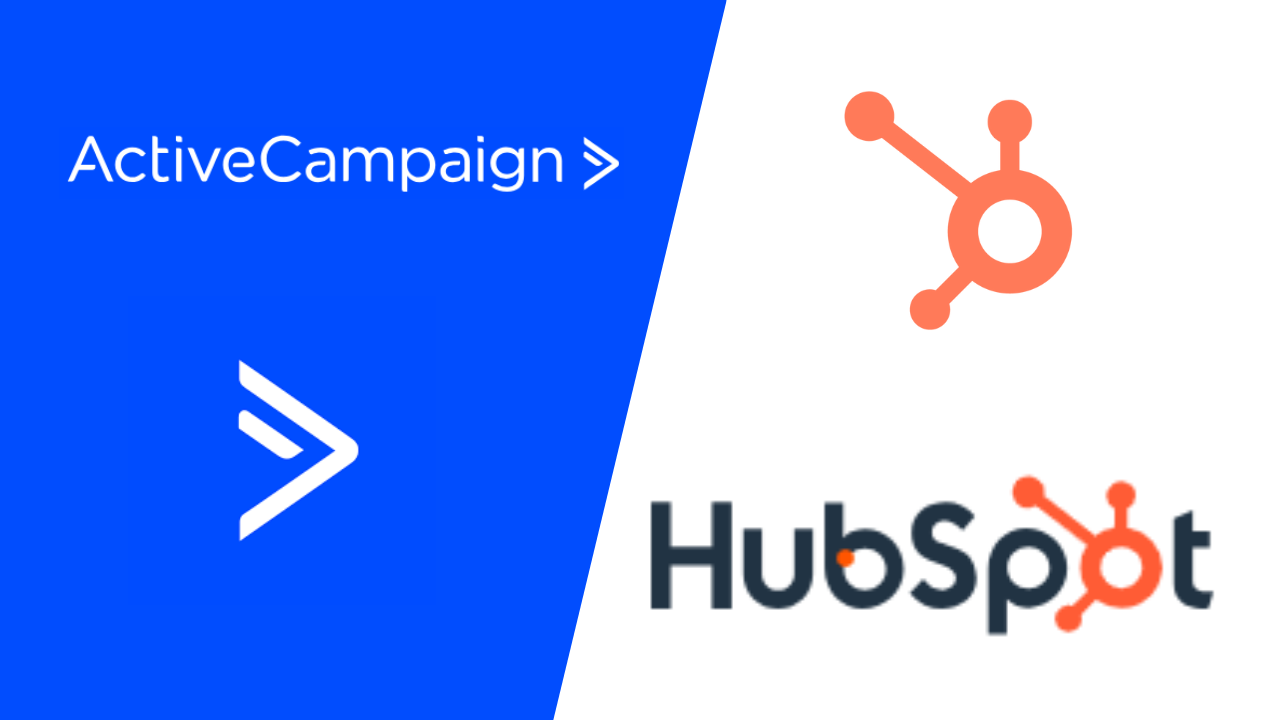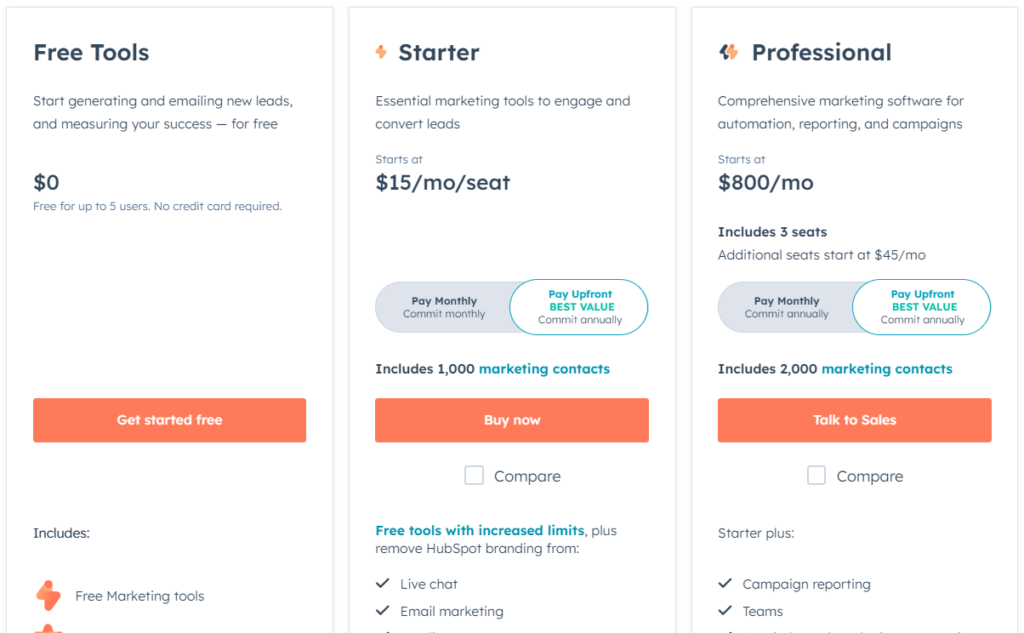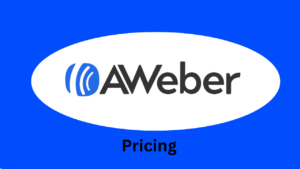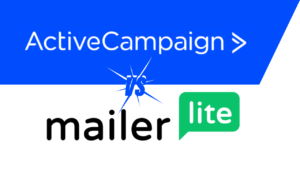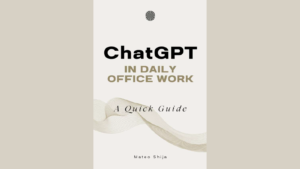Introduction
Choosing between ActiveCampaign vs HubSpot for your marketing automation and CRM needs is a pivotal decision that can significantly influence the success of your business’s digital marketing efforts. In this comprehensive guide, we’ll dive deep into the strengths and weaknesses of both platforms, comparing them across various categories such as ease of use, email marketing features, CRM and sales features, integration options, and more.
Whether you’re a small business owner, a marketing professional, or part of a larger enterprise, understanding how ActiveCampaign and HubSpot stack up against each other will help you make an informed choice that aligns with your business goals and operational needs. Join us as we explore each platform’s capabilities, pricing plans, customer support, and more, culminating in a final recommendation to guide your decision.
Table of Contents
2. An Overview : ActiveCampaign vs HubSpot
In the evolving world of digital marketing, two platforms have consistently stood out for empowering businesses to nurture leads, automate marketing processes, and grow their customer base: ActiveCampaign and HubSpot. Both platforms offer a suite of tools designed to streamline marketing, sales, and customer service efforts, but they cater to different needs and business sizes, making the choice between them significant for marketers and business owners alike.
ActiveCampaign is renowned for its advanced email marketing, marketing automation, and CRM capabilities. It’s tailored for businesses looking for a highly customizable platform that can adapt to complex marketing funnels and segmentation strategies. With its rich features set, ActiveCampaign excels in creating personalized customer experiences.

HubSpot, on the other hand, positions itself as an all-in-one growth platform, offering a broader range of tools that encompass CRM, email marketing, sales, and website management. HubSpot is celebrated for its user-friendly interface and comprehensive inbound marketing features, making it ideal for businesses aiming to attract, engage, and delight customers in a cohesive manner.

Choosing between ActiveCampaign and HubSpot hinges on understanding their core functionalities, pricing models, ease of use, and how they align with your business goals. This comparison aims to shed light on these aspects, guiding you towards making an informed decision that will best suit your marketing needs.

3. Easy of Use
When comparing ActiveCampaign vs HubSpot, the “Ease of Use” is a crucial factor for many businesses deciding on the right marketing automation and CRM platform. Both platforms aim to be accessible, but they cater to users with different levels of technical expertise and resources.
ActiveCampaign: User-Friendly with a Learning Curve
ActiveCampaign is celebrated for its advanced email marketing and automation features. However, newcomers might find its plethora of options slightly overwhelming at first glance. The dashboard presents a comprehensive overview of campaigns, contacts, and automation, which, while powerful, requires a brief learning period to navigate efficiently.
The platform shines in its automation builder, which, despite its complexity, offers intuitive drag-and-drop functionality. Users can create complex automation sequences but might need to invest time in learning to utilize these features to their full potential.
HubSpot: Intuitive Design Meets Comprehensive Functionality
HubSpot is often praised for its intuitive design and ease of use, making it an attractive option for businesses of all sizes. Its clean and user-friendly interface ensures that even those new to CRM and marketing automation can get started without a steep learning curve.
One of HubSpot’s strengths is the seamless integration of its CRM system with marketing, sales, and service hubs. This integration makes it easier for users to navigate and manage their business processes in one place, without the need to switch between different tools or modules.
Both ActiveCampaign and HubSpot offer unique advantages in terms of ease of use. ActiveCampaign, with its detailed customization options, might appeal more to users looking for depth in automation, whereas HubSpot’s all-encompassing, user-friendly approach suits businesses looking for an integrated solution with a gentler learning curve.
4. Email Marketing Features: ActiveCampaign vs HubSpot
In the realm of digital marketing, email continues to be a crucial channel for personalizing customer experiences and driving engagement. Both ActiveCampaign and HubSpot offer robust email marketing features, but their approaches and strengths vary, catering to different business needs and marketing strategies.
ActiveCampaign: A Powerhouse for Personalization and Automation
ActiveCampaign stands out for its advanced automation capabilities, which are among the most sophisticated in the industry. The platform allows for highly personalized email campaigns based on user behavior, preferences, and previous interactions. This level of customization is invaluable for businesses looking to send targeted, relevant content to their audiences.
Furthermore, ActiveCampaign offers a wide range of professional-looking email templates that can be easily customized without needing extensive design skills. The drag-and-drop email builder is user-friendly, making it simple to create visually appealing emails that resonate with your audience.
When it comes to deliverability, ActiveCampaign has a solid reputation. It provides tools and best practices to help ensure emails land in inboxes and not spam folders, including testing and optimization features to improve open rates and engagement.
HubSpot: Seamless Integration and Comprehensive Analytics
HubSpot’s email marketing features are designed to work seamlessly with its CRM and sales platforms, enabling a cohesive workflow from email campaigns to customer relationship management. This integration ensures that every email is informed by detailed customer data, enhancing the relevance and effectiveness of your communication.
The platform offers a robust selection of email templates, and its email builder is intuitive, allowing for easy customization and branding. HubSpot excels in providing detailed analytics on email performance, including open rates, click-through rates, and more, which can be leveraged to refine and optimize future campaigns.
While ActiveCampaign offers unparalleled depth in automation and personalization capabilities, making it a favorite for marketers looking to create complex, behavior-driven campaigns, HubSpot’s strength lies in its seamless integration with its CRM system and comprehensive analytics, ideal for businesses seeking a more holistic view of their email marketing efforts.
5. CRM and Sales Features
In the competitive landscape of CRM and sales automation platforms, understanding the specific features and capabilities of each tool is key to making an informed decision. When comparing ActiveCampaign vs HubSpot, it’s important to note how each platform approaches CRM and sales features, as this can significantly impact your business’s relationship management and sales processes.
ActiveCampaign: Advanced CRM with a Focus on Automation
ActiveCampaign’s CRM is designed to work seamlessly with its powerful email marketing and automation tools. This integration allows for sophisticated lead scoring, automated sales sequences, and detailed contact segmentation based on interactions with your emails and website.
Despite being known primarily for its marketing automation capabilities, ActiveCampaign offers a robust set of CRM and sales features, especially in its Plus, Professional, and Enterprise plans. These features include sales automation workflows, which can automate follow-ups, task assignments, and update deal stages based on predefined criteria.
HubSpot: A Comprehensive CRM and Sales Platform
HubSpot, on the other hand, offers a CRM at its core, designed to be the foundation of its entire ecosystem. This free CRM is not only powerful but also scales with the rest of HubSpot’s Hubs (Marketing, Sales, Service, and CMS), providing businesses with an integrated approach to managing their customer relationships and sales pipeline.
HubSpot’s CRM and Sales Hub include features such as email tracking and notifications, a library of sales documents, and meeting scheduling, all accessible within the CRM. As you move up to the Professional and Enterprise plans, you gain access to more advanced features like sales playbooks, predictive lead scoring, and custom reporting.
Both ActiveCampaign and HubSpot offer compelling CRM and sales features, but their approaches cater to different business needs. ActiveCampaign is ideal for businesses looking for a CRM that deeply integrates with advanced marketing automation, enhancing the alignment between marketing and sales efforts. HubSpot, with its comprehensive CRM at the core of its platform, is suited for businesses seeking an all-in-one solution that provides seamless integration across marketing, sales, service, and content management.
6. ActiveCampaign vs HubSpot: Pricing and Plans
When comparing ActiveCampaign and HubSpot, understanding their pricing structures and plans is crucial for businesses looking to maximize their marketing automation and CRM capabilities. Both platforms offer a range of options tailored to various business sizes and needs, but their pricing models and what’s included at each level differ significantly.
ActiveCampaign Pricing Overview
- Lite Plan: Starts at a relatively low monthly fee for up to 500 contacts, focusing on basic email marketing, automation, and a CRM. It’s ideal for small businesses or those just starting with automation.
- Plus Plan: This mid-tier option adds more advanced features such as landing pages, contact scoring, and deeper integration capabilities. It’s suited for growing businesses that need more from their marketing tools.
- Professional and Enterprise Plans: These high-end plans offer everything from machine learning capabilities to custom reporting and dedicated support. They’re best for large businesses or those with sophisticated marketing needs
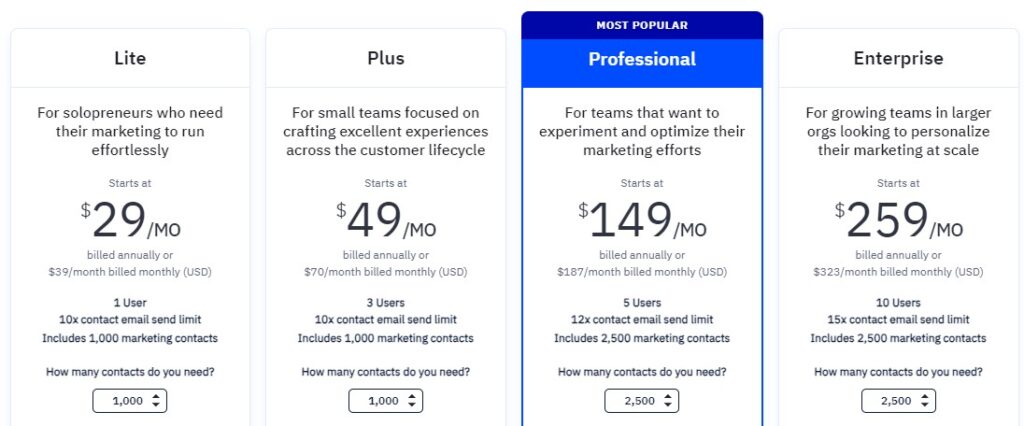
HubSpot Pricing Overview
- Free Tools: HubSpot offers a comprehensive set of free tools covering basic CRM, email marketing, and forms. It’s an excellent start for businesses not ready to invest heavily.
- Starter Plan: Introduces more sophisticated CRM features, email marketing capabilities, and custom reporting, with pricing based on the number of contacts.
- Professional and Enterprise Plans: These plans are significantly more expensive but offer extensive marketing automation, analytics, and customization options. They cater to large teams and businesses with complex sales cycles.
Key Differences and Considerations
- Starting Price: ActiveCampaign offers a lower entry price compared to HubSpot’s Starter Plan, making it more accessible for small businesses or those with a tight budget.
- Scalability: HubSpot’s pricing can escalate quickly as you add contacts and require more advanced features, making ActiveCampaign a potentially more cost-effective option for growing businesses.
- Feature Set at Each Level: HubSpot provides a broader set of tools at its free and Starter levels, particularly in CRM and sales features. ActiveCampaign focuses more on email marketing and automation at its entry levels.
Choosing between ActiveCampaign and HubSpot comes down to your business’s specific needs, budget, and growth plans. ActiveCampaign might be more appealing for those focused on email marketing and automation at a lower cost. In contrast, HubSpot offers a broader range of CRM and sales tools that can benefit businesses looking for an all-in-one solution, albeit at a higher price point as you scale. Consider your long-term strategy and how each platform’s pricing and features align with your goals.
7. Marketing Automation Capabilities
In the digital marketing landscape, the automation capabilities of a platform can significantly enhance the effectiveness and efficiency of campaigns. When comparing ActiveCampaign vs HubSpot in terms of marketing automation capabilities, it’s clear that both platforms offer robust tools designed to streamline marketing processes, improve customer engagement, and drive sales. This section delves into their automation features, providing insights into how they can benefit businesses.
ActiveCampaign: Sophisticated Automation for Personalized Campaigns
ActiveCampaign stands out for its sophisticated marketing automation features. It offers a visual automation builder that allows users to create complex, multi-step campaigns with ease. This tool is incredibly powerful for segmenting audiences, triggering personalized emails based on behavior, and managing sales funnels.
The platform’s strength lies in its detailed segmentation options and the ability to trigger actions based on a wide range of user behaviors and interactions. This level of detail enables businesses to craft highly personalized marketing campaigns that resonate with their audience.
HubSpot: Streamlined Automation within an Integrated Ecosystem
HubSpot offers a seamless marketing automation experience, particularly valued for its integration within the broader HubSpot ecosystem. Its automation features are designed to work hand-in-hand with its CRM, ensuring that every customer interaction is informed by a comprehensive view of their journey.
While perhaps not as granular in segmentation and triggers as ActiveCampaign, HubSpot excels in creating efficient, automated marketing workflows that guide leads through the sales funnel. Its strength lies in its ability to automate across marketing, sales, and service hubs, creating a unified customer experience.
Both ActiveCampaign and HubSpot offer compelling marketing automation capabilities, but they cater to slightly different needs. ActiveCampaign is the go-to for businesses seeking advanced segmentation and personalized automation, while HubSpot is ideal for those looking for a more integrated approach to automation across all customer interactions.
8. Integration Options
In today’s digital ecosystem, the ability of a marketing automation or CRM platform to integrate with other tools and services is a critical factor in its overall utility and effectiveness. When evaluating ActiveCampaign vs HubSpot regarding their integration options, it’s essential to consider not only the number of integrations available but also the depth and flexibility of these integrations. Let’s explore how each platform fares in this domain.
ActiveCampaign: A Wide Array of Integrations for Enhanced Functionality
ActiveCampaign offers a vast library of integrations with over 850+ third-party applications, covering a wide range of categories such as email, CRM, customer service, and ecommerce platforms. This extensive network of integrations ensures that businesses can connect ActiveCampaign with other tools they already use, enhancing their marketing automation and customer relationship management processes without significant changes to their existing workflows.
One of the strengths of ActiveCampaign’s integration options is the platform’s flexibility. It allows for deep customization within each integration, enabling businesses to tailor their marketing and sales activities to their specific needs. Whether it’s syncing customer data from an ecommerce platform or triggering actions based on interactions within a customer service tool, ActiveCampaign’s integrations extend its functionality far beyond its core offerings.
HubSpot: Seamless Integration within Its Own Ecosystem and Beyond
HubSpot excels in offering seamless integrations, not only with external applications but also within its own suite of tools, including the Marketing Hub, Sales Hub, Service Hub, and CMS Hub. This internal ecosystem integration provides a unified platform experience, reducing the need for extensive third-party integrations.
However, HubSpot also boasts a healthy selection of external integrations, with hundreds of apps in its marketplace. These integrations cover various needs from accounting and finance to webinar platforms, ensuring that HubSpot can act as the central hub for a business’s operations. The platform’s emphasis on ease of use extends to its integration setup, aiming to make it straightforward for users to connect their favorite tools without needing deep technical expertise.
Both ActiveCampaign and HubSpot offer robust integration options, but their approaches cater to different preferences and needs. ActiveCampaign’s extensive list of third-party integrations is ideal for businesses looking to enhance a highly customized tech stack. In contrast, HubSpot’s strength lies in its cohesive ecosystem, making it a great choice for companies seeking an all-in-one solution with the flexibility to integrate with key external applications as needed.
9. Analytics and Reporting
In the realm of digital marketing, the ability to track, analyze, and report on your efforts is indispensable. This capability ensures that you can understand what’s working, what isn’t, and how you can optimize your strategies for better results. When considering ActiveCampaign vs HubSpot in terms of their analytics and reporting features, it’s clear that both platforms offer powerful tools to help businesses make data-driven decisions. However, the depth, accessibility, and focus of their reporting functionalities differ.
ActiveCampaign: Detailed Insights for Email and Automation Campaigns
ActiveCampaign provides users with a comprehensive set of analytics tools focused on email marketing and automation performance. The platform offers reports on email campaign performance, including open rates, click-through rates, and conversion metrics. Additionally, ActiveCampaign’s split testing features allow marketers to test different email formats and content, providing insights into what resonates best with their audience.
Beyond email-specific analytics, ActiveCampaign offers reporting on automation sequences, tracking how contacts engage with each step of your marketing and sales funnels. This level of detail is invaluable for optimizing automation workflows to improve engagement and conversions.
HubSpot: Comprehensive Analytics Across the Marketing Funnel
HubSpot, with its all-in-one platform approach, provides a broader set of analytics and reporting features that cover the entire marketing funnel, from website traffic and lead generation to sales and customer service interactions. The platform’s integrated nature allows for a unified view of customer interactions across all touchpoints, making it easier to attribute marketing efforts to sales outcomes..
One of HubSpot’s strengths in analytics is its customizable dashboards, which can be tailored to display the most relevant metrics for your business. Additionally, the platform’s built-in SEO tools and content strategy reports offer insights into how your content is performing in terms of attracting and converting leads.
Both ActiveCampaign and HubSpot offer robust analytics and reporting capabilities, but their strengths cater to different aspects of digital marketing. ActiveCampaign excels in providing detailed insights into email marketing and automation performance, making it a strong choice for businesses focused on optimizing these channels. HubSpot, on the other hand, offers a comprehensive analytics suite that covers the entire marketing funnel, ideal for businesses looking for an all-encompassing view of their marketing, sales, and customer service efforts.
10. Mobile App and Accessibility
In an increasingly mobile world, the availability and functionality of a mobile app for marketing automation and CRM platforms are more crucial than ever. Accessibility features also play a significant role, ensuring that all users, regardless of their abilities, can efficiently work with these tools. When comparing ActiveCampaign vs HubSpot in terms of their mobile app and accessibility, it’s essential to evaluate not only the presence of a mobile application but also its features, usability, and how these platforms cater to users with different needs.
ActiveCampaign: On-the-Go Accessibility with a Focus on Email Marketing
ActiveCampaign’s mobile app provides users with the ability to manage their email marketing campaigns and automation workflows from anywhere. The app allows for monitoring campaign performance, managing contacts, and even sending out emails directly from your phone, ensuring that you’re always connected to your marketing efforts.
While the app covers the basics well, some users may find that the mobile experience doesn’t fully replicate the depth of features available on the desktop version, particularly in terms of automation complexity and detailed analytics. However, for businesses primarily focused on email marketing, the app provides sufficient functionality for managing campaigns effectively while away from the office.
HubSpot: A Comprehensive Mobile Experience with Integrated Features
HubSpot’s mobile app is designed to offer a more comprehensive experience, reflecting the platform’s all-in-one approach. The app enables users to access a wide range of features, including CRM, sales tools, and marketing analytics, directly from their mobile device. This accessibility ensures that you can stay on top of your business activities, from managing contacts and deals to reviewing campaign analytics, no matter where you are.
Additionally, HubSpot places a strong emphasis on accessibility, ensuring that its platform and mobile app are usable by people with various disabilities. This commitment is reflected in features like keyboard navigability, screen reader compatibility, and adherence to accessibility standards, making it a more inclusive platform.
Both ActiveCampaign and HubSpot recognize the importance of mobile app functionality and accessibility in today’s digital marketing landscape. ActiveCampaign offers solid email marketing and basic automation capabilities on the go, making it a good choice for users primarily focused on these areas. HubSpot, with its comprehensive mobile app, provides a broader range of features accessible from anywhere, along with a strong focus on accessibility, making it an excellent option for businesses looking for an all-in-one solution that is also inclusive.
11. Compliance and Security
In an era where data breaches are a frequent headline and regulatory bodies are increasingly stringent, the compliance and security measures of any digital platform, especially those dealing with customer data, cannot be overstated. When evaluating ActiveCampaign vs HubSpot for their compliance and security protocols, it’s essential for businesses to understand how each platform protects data and adheres to global regulations, ensuring both customer trust and regulatory compliance.
ActiveCampaign: Robust Security with a Focus on Data Protection
ActiveCampaign takes data security and privacy seriously, implementing a range of measures to protect customer information. These include standard security practices such as encryption in transit and at rest, regular security assessments, and compliance with key regulations like GDPR, HIPAA (for eligible customers), and more.
Furthermore, ActiveCampaign offers features like two-factor authentication (2FA) and user permission settings, allowing businesses to add an extra layer of security and control over who accesses their account and what information they can see.
HubSpot: Comprehensive Security Measures and Global Compliance
HubSpot is renowned for its high standards in security and compliance, catering to businesses worldwide. The platform ensures data security through a comprehensive approach that includes data encryption, regular security audits, and a dedicated security team. HubSpot also complies with international regulations such as GDPR, and is Privacy Shield certified, reflecting its commitment to user data protection across borders.
In addition to its security infrastructure, HubSpot provides users with various tools to enhance account security, including 2FA, SSL certification for all hosted content, and advanced user permission settings. These features ensure that sensitive information remains protected and that businesses can easily comply with data protection laws.
Both ActiveCampaign and HubSpot prioritize compliance and security, offering robust protections for their users’ data. ActiveCampaign provides solid security measures tailored to email marketing and automation, while HubSpot offers a broader range of security features and compliance certifications due to its all-encompassing platform nature. Choosing between them will depend on your specific needs, but both platforms demonstrate a strong commitment to keeping user data secure and compliant with global regulations.
12. Company Reputation and Reliability
In the competitive world of marketing automation and CRM platforms, the reputation and reliability of a company are as crucial as the features and functionalities of its software. When businesses decide between ActiveCampaign vs HubSpot, understanding the standing of these companies in the industry can provide valuable context for their offerings and the kind of support and innovation they can expect in the long run. Let’s delve into the reputations and reliability of ActiveCampaign and HubSpot.
ActiveCampaign: A Trusted Leader in Customer Experience Automation
ActiveCampaign has built its reputation around providing powerful yet accessible email marketing and automation tools, with a particular focus on customer experience automation. Celebrated for its high customer satisfaction rates, ActiveCampaign has garnered praise for its robust features, customer support, and user-friendly interface.
Over the years, ActiveCampaign has also shown a strong commitment to innovation, regularly updating its platform with new features and capabilities. This dedication to improvement and growth has helped solidify its reliability among small to medium-sized businesses and digital marketers worldwide.
HubSpot: An Industry Powerhouse with a Comprehensive Platform
HubSpot stands as a powerhouse in the marketing, sales, and service software industry. Its reputation is built on the comprehensive nature of its platform, which offers an all-in-one solution for businesses looking to grow their online presence and improve customer relationships.
HubSpot’s reliability is underscored by its substantial user base, ranging from small businesses to large enterprises, and its active community of users and developers. The company’s emphasis on education and community-building, through its HubSpot Academy and extensive resources, further enhances its standing in the industry.
Both ActiveCampaign and HubSpot have established strong reputations and proven themselves to be reliable platforms for marketing automation and CRM. ActiveCampaign is often favored for its specialized approach to customer experience automation and high customer satisfaction, while HubSpot is renowned for its comprehensive platform and significant industry presence. The choice between them may come down to specific business needs, but both companies offer the reassurance of stability, ongoing support, and a commitment to innovation.
13. Conclusion and Final Recommendation
Choosing the right marketing automation and CRM platform is a critical decision for any business looking to enhance its marketing efforts, streamline operations, and improve customer relationships. Throughout this comparison of ActiveCampaign vs HubSpot, we’ve explored various facets from ease of use and email marketing features to integration options and security measures. Both platforms offer unique strengths and could be the best choice for different business needs and priorities.
ActiveCampaign: Ideal for Advanced Email Marketing and Automation
ActiveCampaign stands out for its sophisticated email marketing and automation capabilities, making it an excellent choice for businesses that prioritize these aspects. Its visual automation builder and extensive integration options offer the flexibility to create highly personalized and effective marketing campaigns.
For small to medium-sized businesses looking for a platform that combines powerful features with a relatively gentle learning curve and scalability, ActiveCampaign offers an attractive balance between functionality and cost.
HubSpot: The All-in-One Solution for Growing Businesses
HubSpot, with its comprehensive suite of tools covering marketing, sales, service, and content management, is ideal for businesses seeking an all-in-one solution. Its ease of use, combined with powerful CRM capabilities and seamless integrations within its ecosystem, makes it a robust platform for businesses aiming to scale their operations and streamline their processes across departments.
For companies that value a platform that can grow with them and offer extensive resources and support, HubSpot represents a significant investment in their future marketing and sales success.
Final Recommendation
When deciding between ActiveCampaign and HubSpot, consider your business’s specific needs, budget, and long-term goals. If your focus is on email marketing and automation with a desire for deep customization, ActiveCampaign may be your platform of choice. On the other hand, if you’re looking for a comprehensive solution that covers a wide range of marketing, sales, and service needs with an integrated approach, HubSpot could be the better investment.
In conclusion, both ActiveCampaign and HubSpot offer powerful platforms capable of transforming your marketing and sales efforts. By carefully considering your priorities and how each platform aligns with your business strategy, you can make an informed decision that supports your growth and success in the digital age.
